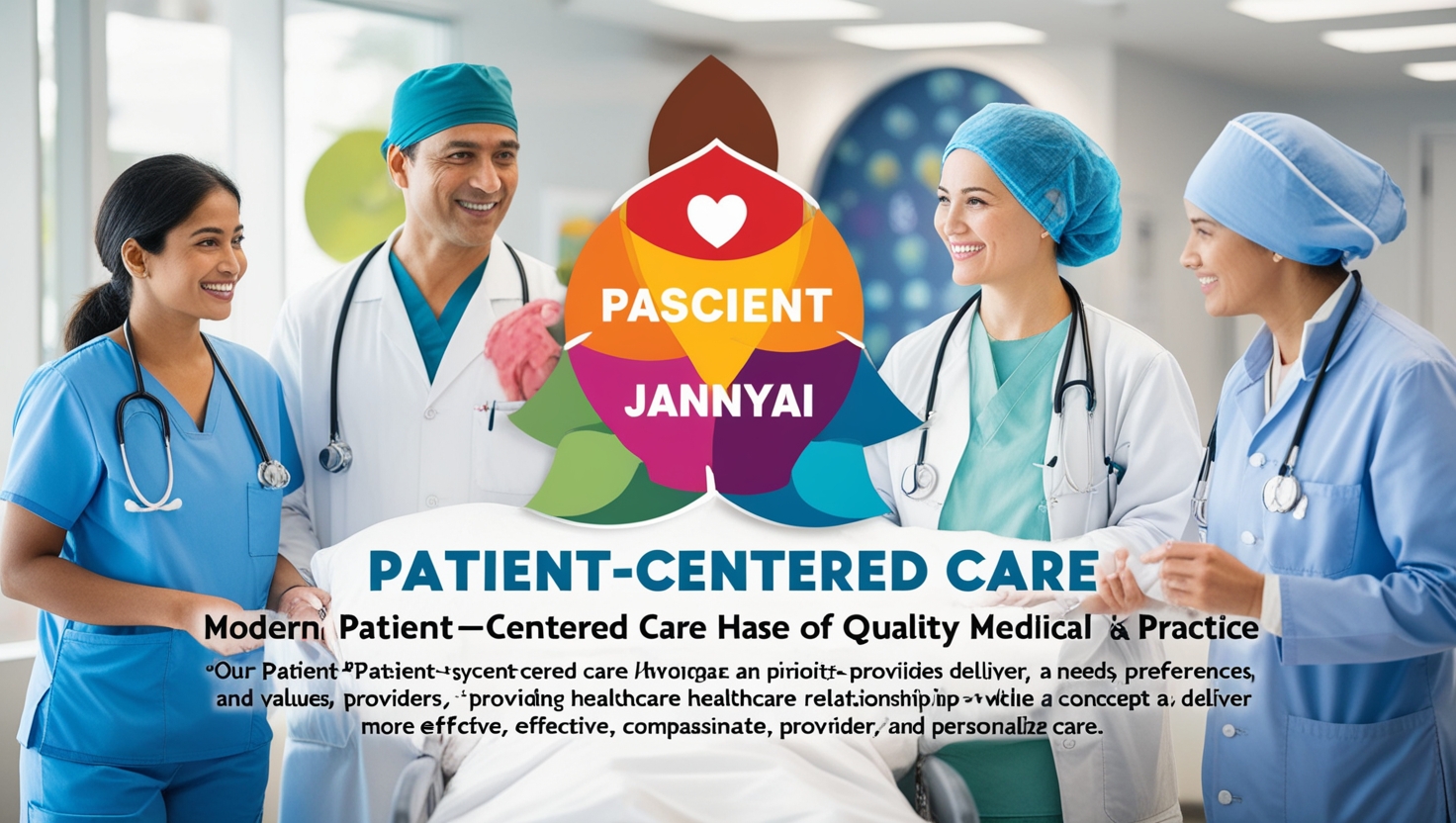In modern healthcare, patient-centered care has emerged as a cornerstone of quality medical practice. The concept of “Pascient Jannyai” embodies this philosophy, prioritizing the needs, preferences, and values of patients while fostering a collaborative relationship between healthcare providers and recipients. By embracing this approach, healthcare systems can deliver more effective, compassionate, and personalized care. This model not only transforms patient experiences but also addresses critical challenges in the healthcare sector, ensuring a holistic approach to well-being.
The Foundations of Pascient Jannyai
Understanding Patient-Centered Care
Patient-centered care focuses on the holistic well-being of individuals, considering their physical, emotional, and social needs. It moves beyond treating illnesses to fostering a supportive environment where patients feel heard, respected, and empowered. This philosophy recognizes that each patient is unique, and their care should reflect their individuality rather than a one-size-fits-all approach.
The Origins of Pascient Jannyai
The term “Pascient Jannyai” symbolizes a paradigm shift in healthcare, emphasizing active listening, empathy, and collaboration. Rooted in ethical principles, this approach aligns with global efforts to enhance patient satisfaction and outcomes. The origins of this term may be symbolic of integrating age-old compassionate practices with modern advancements, creating a unified model of care.
Core Principles of Pascient Jannyai
Respect for Patient Values
Central to the Pascient Jannyai philosophy is respecting patients’ preferences and cultural backgrounds. Healthcare providers must recognize individual differences and tailor care plans accordingly. This includes accommodating dietary preferences, spiritual needs, and family dynamics, ensuring that patients feel valued and understood.
Shared Decision-Making
Collaboration between patients and healthcare providers is a hallmark of this approach. By involving patients in decision-making, providers ensure that treatments align with patients’ goals and lifestyles. Shared decision-making fosters trust and empowers patients to take an active role in their health, leading to better adherence to treatment plans.
Holistic Care
Pascient Jannyai advocates for addressing the complete spectrum of patient needs. This includes managing physical symptoms, offering emotional support, and considering social determinants of health. Holistic care recognizes that factors such as housing, employment, and social support significantly impact health outcomes.
Continuity of Care
Ensuring seamless transitions between different stages of care is essential. The Pascient Jannyai approach promotes coordinated efforts across multidisciplinary teams to provide consistent and comprehensive care. From primary care to specialized treatments and rehabilitation, continuity ensures that patients experience smooth and efficient healthcare journeys.
Implementation of Pascient Jannyai in Healthcare
Training Healthcare Professionals
For the Pascient Jannyai approach to succeed, healthcare providers must receive training in communication, cultural competence, and empathy. These skills enable providers to build trust and rapport with patients. Continuous professional development programs should emphasize active listening, emotional intelligence, and patient engagement strategies.
Leveraging Technology
Technology plays a pivotal role in patient-centered care. Electronic health records (EHRs), telemedicine, and patient portals empower individuals to access their medical information and participate in their care actively. Remote monitoring devices and AI-powered health apps further enhance personalization, enabling timely interventions and proactive care management.
Designing Patient-Friendly Facilities
Healthcare environments should prioritize comfort, accessibility, and privacy. Creating spaces that cater to diverse needs, such as quiet rooms, child-friendly zones, and gender-sensitive facilities, enhances the overall patient experience. Inclusive design principles ensure that all patients, including those with disabilities, feel accommodated and respected.
Feedback Mechanisms
Incorporating patient feedback into care strategies is vital. Regular surveys, focus groups, and open communication channels allow healthcare systems to adapt and improve continuously. Patient advisory councils can also provide valuable insights into patient experiences, shaping policies and practices that reflect their needs.
Benefits of Pascient Jannyai
Improved Patient Outcomes
Patient-centered care leads to better health outcomes by addressing the unique needs of individuals. Studies show that this approach reduces hospital readmissions, enhances medication adherence, and promotes faster recovery. By focusing on preventive care and early intervention, it also minimizes complications and chronic disease progression.
Enhanced Patient Satisfaction
When patients feel valued and involved in their care, satisfaction levels rise. The Pascient Jannyai model fosters trust and strengthens the provider-patient relationship. Satisfied patients are more likely to recommend services, contributing to positive reputations for healthcare organizations.
Reduced Healthcare Costs
By focusing on preventive care and efficient resource utilization, patient-centered care reduces unnecessary procedures and hospitalizations, resulting in cost savings. Early detection of health issues through regular monitoring and patient education can significantly lower long-term expenses.
Greater Provider Satisfaction
Healthcare providers also benefit from the Pascient Jannyai approach. By building meaningful connections with patients, providers experience increased job satisfaction and reduced burnout. A collaborative and empathetic work environment enhances team morale and productivity.
Challenges in Adopting Pascient Jannyai
Resistance to Change
Transitioning to a patient-centered model requires significant cultural and structural changes, which may face resistance from stakeholders accustomed to traditional approaches. Overcoming this resistance involves clear communication about the benefits and providing training to ease the transition.
Resource Constraints
Implementing Pascient Jannyai often demands additional resources, including staff training, technological upgrades, and infrastructure improvements. Healthcare systems must allocate budgets effectively to support these changes while ensuring quality care.
Balancing Standardization and Personalization
While standard protocols are essential in healthcare, the Pascient Jannyai approach emphasizes personalization, requiring a delicate balance between the two. Providers must adapt guidelines to suit individual patient needs without compromising safety or efficacy.
Measuring Success
Quantifying the impact of patient-centered care can be challenging. Metrics such as patient satisfaction scores, health outcomes, and cost savings must be carefully tracked to demonstrate the effectiveness of the Pascient Jannyai approach.
Conclusion
The Pascient Jannyai philosophy represents a transformative shift in healthcare, prioritizing the needs, preferences, and values of patients. By fostering collaboration, empathy, and respect, this approach enhances the quality of care and ensures better health outcomes. As healthcare systems continue to evolve, embracing the principles of Pascient Jannyai will be instrumental in creating a more compassionate and effective healthcare environment. The journey toward patient-centered care is a collective effort that requires commitment, innovation, and an unwavering focus on human dignity
FAQs
What is Pascient Jannyai?
Pascient Jannyai is a patient-centered care approach that prioritizes the needs, preferences, and values of patients while fostering collaboration between healthcare providers and recipients.
Why is patient-centered care important?
Patient-centered care improves health outcomes, enhances patient satisfaction, reduces healthcare costs, and fosters better provider-patient relationships.
How can healthcare providers implement Pascient Jannyai?
Providers can implement Pascient Jannyai by undergoing training in communication and empathy, leveraging technology, designing patient-friendly facilities, and incorporating patient feedback into care strategies.
What are the benefits of Pascient Jannyai?
The benefits include improved patient outcomes, enhanced satisfaction, reduced healthcare costs, and greater provider job satisfaction.










